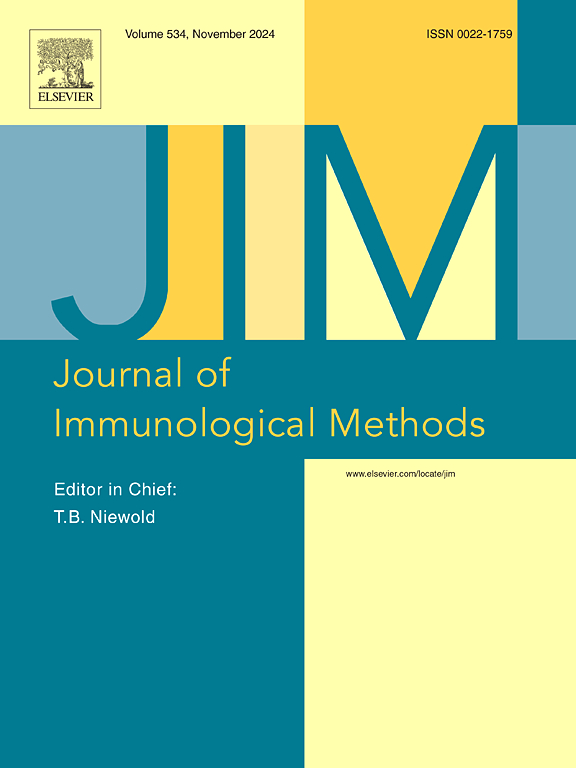Optimization of IgG1 immune complexes to stimulate cytokine production in innate cells
IF 1.6
4区 医学
Q4 BIOCHEMICAL RESEARCH METHODS
引用次数: 0
Abstract
Fcγ receptors are key immunoreceptors, that when bound by IgG immune complexes, trigger activation of downstream signaling pathways. However, there are limited in vitro assays that stimulate innate cells via Fcγ receptors that allow for evaluation of drugs or chemicals on antibody-triggered signaling. Our study investigated the activation of Fcγ receptors in innate cells using immune complexes. Our findings revealed that immobilized IgG antibodies did not elicit a significant immune response, so we designed two IgG1 immune complexes: trinitrophenyl-bovine serum albumin (TNP-BSA)/TNP-IgG1 and streptavidin-biotinylated IgG1 (Strept-Biotin IgG1). Strept-Biotin IgG1 immune complex was particularly effective, significantly enhancing IL-6, TNFα, and C3a levels, whereas TNP-BSA/TNP-IgG1 immune complex showed a modest IL-6 increase. Both TNP-BSA/TNP-IgG1 and Strept-Biotin IgG1 stimulated CD86 marker expression on F4/80+ macrophages. We also confirmed the binding of Strept-Biotin IgG1 to innate cells with fluorochrome-conjugated streptavidin. To further understand the Fcγ receptor-mediated activation of innate cells, we blocked the downstream phosphatidylinositol 3-kinase (PI3K) pathway. We found out that the PI3K inhibitor successfully suppressed IL-6 cytokine release and C3a production. However, specific Fcγ receptor-blocking antibodies failed to block IL-6 cytokine production and only modestly suppressed TNFα cytokine release, suggesting either that the antibodies were not effective blockers or that these immune complexes use other receptors. Regardless, the use of the Strept-Biotin IgG1 immune complex to stimulate cytokine production and other immune signaling was consistent with Fcγ receptor activation on innate cells which might be useful in assessing the effects of drugs or chemicals in innate cells.
优化IgG1免疫复合物刺激先天细胞产生细胞因子。
Fcγ受体是关键的免疫受体,当与IgG免疫复合物结合时,触发下游信号通路的激活。然而,通过Fcγ受体刺激先天细胞的体外实验有限,这些实验允许评估药物或化学物质对抗体触发信号的影响。本研究利用免疫复合物研究了先天细胞中Fcγ受体的激活。我们的研究结果表明,固定的IgG抗体不会引起明显的免疫反应,因此我们设计了两种IgG1免疫复合物:三硝基苯-牛血清白蛋白(TNP-BSA)/TNP-IgG1和链霉亲和素生物素化的IgG1 (streptavidin-biotin IgG1)。链球菌-生物素-IgG1免疫复合物特别有效,显著提高IL-6、TNFα和C3a水平,而tnf - bsa / tnf -IgG1免疫复合物显示适度的IL-6升高。tnf - bsa / tnf -IgG1和Strept-Biotin IgG1均可刺激F4/80+巨噬细胞CD86标志物的表达。我们还证实了链霉亲和素与先天细胞结合的链霉生物素IgG1。为了进一步了解Fcγ受体介导的先天细胞活化,我们阻断了下游磷脂酰肌醇3-激酶(PI3K)途径。我们发现PI3K抑制剂成功抑制了IL-6细胞因子的释放和C3a的产生。然而,特异性Fcγ受体阻断抗体不能阻断IL-6细胞因子的产生,只能适度抑制TNFα细胞因子的释放,这表明抗体不是有效的阻断剂,或者这些免疫复合物使用其他受体。无论如何,使用链球菌-生物素IgG1免疫复合物刺激细胞因子产生和其他免疫信号传导与Fcγ受体对先天细胞的激活是一致的,这可能有助于评估药物或化学物质对先天细胞的影响。
本文章由计算机程序翻译,如有差异,请以英文原文为准。
求助全文
约1分钟内获得全文
求助全文
来源期刊
CiteScore
4.10
自引率
0.00%
发文量
120
审稿时长
3 months
期刊介绍:
The Journal of Immunological Methods is devoted to covering techniques for: (1) Quantitating and detecting antibodies and/or antigens. (2) Purifying immunoglobulins, lymphokines and other molecules of the immune system. (3) Isolating antigens and other substances important in immunological processes. (4) Labelling antigens and antibodies. (5) Localizing antigens and/or antibodies in tissues and cells. (6) Detecting, and fractionating immunocompetent cells. (7) Assaying for cellular immunity. (8) Documenting cell-cell interactions. (9) Initiating immunity and unresponsiveness. (10) Transplanting tissues. (11) Studying items closely related to immunity such as complement, reticuloendothelial system and others. (12) Molecular techniques for studying immune cells and their receptors. (13) Imaging of the immune system. (14) Methods for production or their fragments in eukaryotic and prokaryotic cells.
In addition the journal will publish articles on novel methods for analysing the organization, structure and expression of genes for immunologically important molecules such as immunoglobulins, T cell receptors and accessory molecules involved in antigen recognition, processing and presentation. Submitted full length manuscripts should describe new methods of broad applicability to immunology and not simply the application of an established method to a particular substance - although papers describing such applications may be considered for publication as a short Technical Note. Review articles will also be published by the Journal of Immunological Methods. In general these manuscripts are by solicitation however anyone interested in submitting a review can contact the Reviews Editor and provide an outline of the proposed review.

 求助内容:
求助内容: 应助结果提醒方式:
应助结果提醒方式:


